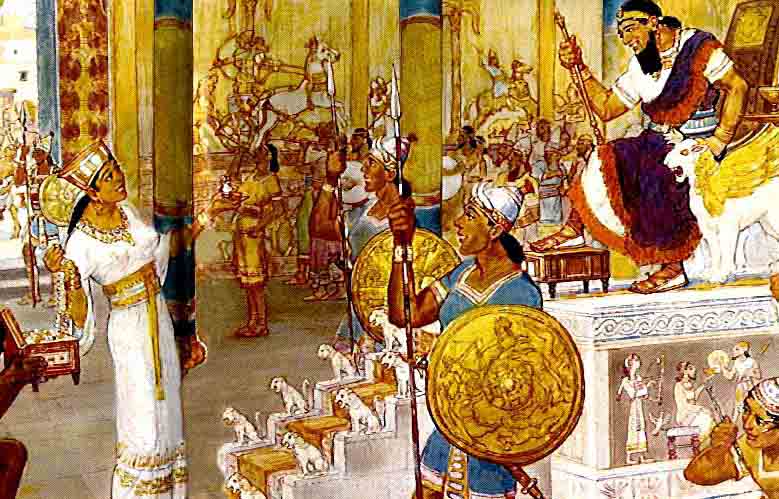THE SEED
And Solomon brought up the daughter of Pharaoh, out of the city of David unto the house that he had built for her: for he said, my wife shall not dwell in the house of David king of Israel, because the places are holy. 2nd Chronicles 8:11.
Solomon married the daughter of Pharaoh against the commandment of God to Israel about marriage. His fame had gone throughout the whole world, known for extraordinary wisdom, knowledge and understanding having built a temple for God and receiving accolades from all parts of the world. However, in the midst of all these glory, he disobeyed the commandment of God given to Israel never to marry foreigners. It was not recorded that God complained about this step which led him to marrying many more foreign women. Yet, he fell from grace. He started serving idols instead of the God of Israel. Many times, when we disobey God and don’t hear or see him complain, we take it for granted or approval of our deed and see it as nothing. This leads us into falling into the worst sins. It is written that the one the Lord loves, he chastens. Hebrew 12:6. So, when God is quiet about our sin, we should rather be worried, because it means we have drifted away from His love, which eventually will not end well. Psalm 119:67.
BIBLE READING: 1 Kings 11:1-8
PRAYER: Oh Lord, help me to walk in your will all the days of my life, and to never take you for granted in Jesus mighty name.
MA GBA IDAKEJE RE FUN IDAHUN RE
IRUGBIN NAA
Solomoni si mu ọmọbinrin Farao gòke lati ilu Dafidi wá si ile ti o ti kọ́ fun u: nitoriti o wipe, Aya mi kì yio gbe ile Dafidi, ọba Israeli, nitoriti ibi mimọ́ ni wọn. 2 Kíróníkà 8:11
Solomoni fẹ́ ọmọbinrin Farao lòdì sí òfin Ọlọrun fún Israẹli nípa ìgbéyàwó. Òkìkí rẹ̀ ti lọ káàkiri gbogbo ayé, tí a mọ̀ sí ọgbọ́n àrà ọ̀tọ̀, ìmọ̀ àti òye nígbà tí ó kọ́ tẹ́ńpìlì kan fún Ọlọ́run, ó sì ń gba ìyìn láti gbogbo apá ayé. Bí ó ti wù kí ó rí, ní àárín ògo wọ̀nyí, ó ṣàìgbọràn sí àṣẹ Ọlọrun tí a fi fún Israeli láti má ṣe fẹ́ àjèjì láé. A ko kọwe pe Ọlọrun rojọ nipa igbesẹ yii ti o mu ki o fẹ ọpọlọpọ awọn obinrin ajeji. Síbẹ, o ṣubu lati ore-ọfẹ. Ó bẹ̀rẹ̀ sí sin òrìṣà dípò Ọlọ́run Ísírẹ́lì. Lọ́pọ̀ ìgbà, nígbà tí a bá ṣàìgbọràn sí Ọlọ́run tí a kò sì gbọ́ tàbí rí i tí ó ń ráhùn, a gbà á lásán tàbí ìtẹ́wọ́gbà ti iṣẹ́ wa a sì rí i bí asán. Eyi mu wa lọ sinu isubu sinu awọn ẹṣẹ ti o buru julọ. A ti kọwe rẹ̀ pe, Ẹniti Oluwa fẹ, on ni ibawi. Hébérù 12:6 . Nítorí náà, nígbà tí Ọlọ́run bá dákẹ́ jẹ́ẹ́ nípa ẹ̀ṣẹ̀ wa, a gbọ́dọ̀ máa ṣàníyàn nítorí ó túmọ̀ sí pé a ti ṣáko lọ kúrò nínú ìfẹ́ Rẹ̀, èyí tí kò ní parí rẹ̀ dáadáa. Sáàmù 119:67
BIBELI KIKA: 1 Àwọn Ọba 11:1-8
ADURA: Oluwa, ran mi lowo lati ma rin ninu ife re ni gbogbo ojo aye mi, ati pe ki n ma fi yin lasan ni oruko nla Jesu.
